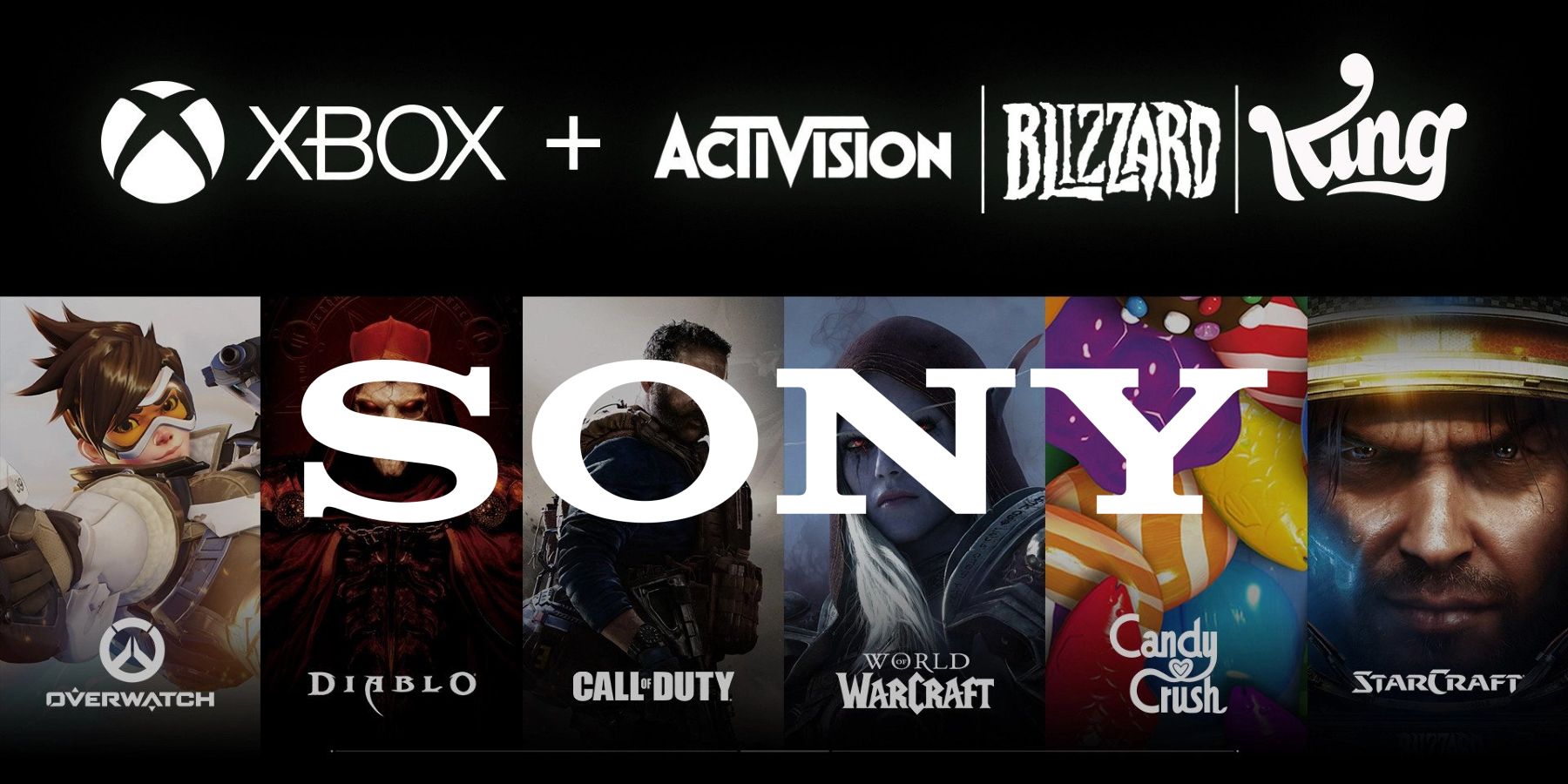FTC Appeals Activision Blizzard Acquisition: Implications For The Gaming Industry

Table of Contents
The FTC's Arguments Against the Acquisition
The FTC argues that the Microsoft-Activision Blizzard merger would create an unfair competitive advantage, potentially stifling competition and harming consumers. This concern stems from the potential impact on multiple areas of the gaming industry.
Concerns about Anti-Competitive Practices
The FTC's core argument revolves around the potential for anti-competitive practices stemming from Microsoft's control over key Activision Blizzard franchises.
- Exclusive Content and Higher Prices: Microsoft's control over popular titles like Call of Duty, World of Warcraft, and Candy Crush Saga could lead to exclusive content, limiting availability on competing platforms and potentially driving up prices. This could significantly disadvantage competitors and limit consumer choice.
- Harm to Rivals: The FTC claims Microsoft could leverage its control to harm rivals like Sony PlayStation, Nintendo Switch, and other game streaming services. This could involve strategic pricing, preferential treatment for Microsoft's own platforms, or deliberate efforts to undermine competitor's offerings.
- Restricted Cross-Platform Play: The FTC highlights the potential for Microsoft to limit or prevent cross-platform play, impacting player communities and reducing the overall enjoyment and accessibility of games. This could significantly affect the social aspect of gaming and damage the user experience.
Defining the Relevant Market
A crucial aspect of the FTC's case involves defining the relevant market. Is it the entire gaming market, or are specific segments, such as console gaming or cloud gaming, more relevant? This determination heavily influences the assessment of market share and potential anti-competitive effects.
- Demonstrating Reduced Competition: The FTC must convincingly demonstrate the specific markets where the merger would lessen competition. This requires detailed market analysis and evidence of substitutability between different gaming platforms.
- Substitutability of Platforms: A core argument centers on the substitutability of gaming platforms and services. The FTC needs to show that the loss of competition in one area (e.g., console gaming) isn't easily offset by alternatives.
- Cloud Gaming as a Distinct Market: The emergence of cloud gaming adds another layer of complexity. The FTC must address whether cloud gaming is a distinct market segment or part of the broader gaming market, affecting how market share is calculated and the overall impact of the merger is assessed.
Microsoft's Defense and Counterarguments
Microsoft counters the FTC's claims, arguing that the acquisition will ultimately benefit consumers and promote competition through innovation and increased accessibility.
Commitment to Maintaining Competition
Microsoft has proactively made several commitments to alleviate the FTC's concerns.
- Call of Duty on PlayStation: Microsoft has pledged to keep Call of Duty on PlayStation for at least ten years, a key concession aimed at addressing concerns about exclusive content and platform lock-in.
- Investments in Cloud Gaming: Microsoft emphasizes its significant investments in cloud gaming and its broader ambition to make gaming more accessible to a wider audience. This strategy aims to create a more inclusive gaming ecosystem.
- Modest Market Share: Microsoft counters that its market share in the gaming industry remains relatively modest, even after the acquisition, arguing that the merger wouldn't create a monopoly.
The Importance of Innovation and Growth
Microsoft argues that the acquisition will foster innovation and create synergies that benefit the entire gaming ecosystem.
- Improved Game Development: Microsoft highlights potential improvements in game development, distribution, and the overall player experience as a result of the combined resources and expertise of both companies.
- Synergies and Enhancements: The argument emphasizes the potential for Activision Blizzard's expertise to enhance Microsoft's gaming capabilities, leading to better games and a more vibrant gaming ecosystem.
- Investment in New Technologies: Microsoft points to the potential for increased investment in new technologies and game development within the combined entity, leading to advancements that benefit all gamers.
Broader Implications for the Gaming Industry
The FTC's appeal has far-reaching implications that extend beyond the immediate parties involved.
Future Mergers and Acquisitions
The outcome of this appeal will profoundly impact the regulatory landscape for future mergers and acquisitions in the gaming industry.
- Increased Scrutiny: Other potential mergers and acquisitions in the gaming sector may face significantly increased regulatory scrutiny, leading to longer review processes and greater hurdles for completion.
- Strategic Adjustments: Companies involved in gaming may adjust their strategies in response to the FTC's approach, leading to changes in how deals are structured and presented to regulators.
- Greater Transparency: The case could lead to greater transparency and oversight in the gaming industry, particularly concerning mergers and acquisitions.
The Future of Game Streaming and Cloud Gaming
The FTC's focus on cloud gaming underscores its growing importance and potential impact on competition.
- Central Focus in Future Regulations: Cloud gaming will likely be a central focus in future regulatory assessments of mergers and acquisitions in the gaming industry.
- Data Privacy and Platform Neutrality: The case could influence the development of regulations concerning data privacy and platform neutrality in cloud gaming, impacting how these services are designed and operated.
- Investment and Innovation: The case’s outcome will have a substantial impact on investment and innovation in cloud gaming technology.
Conclusion
The FTC's appeal against the Activision Blizzard acquisition is a pivotal moment for the gaming industry. The outcome will have profound implications, shaping future mergers and acquisitions, influencing the competitive landscape, and potentially reshaping how games are developed, distributed, and played. This FTC Appeals Activision Blizzard Acquisition case will serve as a key precedent for antitrust enforcement in the tech sector and beyond. It's crucial to closely follow the developments in this case to understand its full impact on the future of gaming and the broader digital market. Stay informed about the progress of the FTC Appeals Activision Blizzard Acquisition to prepare for the changes it will bring to the gaming industry.

Featured Posts
-
 2 2 Million Treatment A Fathers Remarkable Rowing Feat
May 25, 2025
2 2 Million Treatment A Fathers Remarkable Rowing Feat
May 25, 2025 -
 Trump Uitstel Leidt Tot Herstel Op De Aex Welke Fondsen Presteerden Het Best
May 25, 2025
Trump Uitstel Leidt Tot Herstel Op De Aex Welke Fondsen Presteerden Het Best
May 25, 2025 -
 Craig Mc Ilquham Hells Angels Memorial Service Report From Sunday
May 25, 2025
Craig Mc Ilquham Hells Angels Memorial Service Report From Sunday
May 25, 2025 -
 Naomi Campbell Banned From The Met Gala Due To Anna Wintour Conflict
May 25, 2025
Naomi Campbell Banned From The Met Gala Due To Anna Wintour Conflict
May 25, 2025 -
 Francis Sultana Designing The Interiors Of Robuchon Monaco Restaurants
May 25, 2025
Francis Sultana Designing The Interiors Of Robuchon Monaco Restaurants
May 25, 2025
Latest Posts
-
 Decouvrir La Culture Des Gens D Ici
May 25, 2025
Decouvrir La Culture Des Gens D Ici
May 25, 2025 -
 Kiefer Sutherland Pays Tribute To His Late Father At Canadian Screen Awards
May 25, 2025
Kiefer Sutherland Pays Tribute To His Late Father At Canadian Screen Awards
May 25, 2025 -
 Comprendre Les Gens D Ici Guide Pratique
May 25, 2025
Comprendre Les Gens D Ici Guide Pratique
May 25, 2025 -
 La Charentaise De Saint Brieuc Un Modele De Perennite Dans L Industrie De La Chaussure
May 25, 2025
La Charentaise De Saint Brieuc Un Modele De Perennite Dans L Industrie De La Chaussure
May 25, 2025 -
 Saint Brieuc Le Succes Intemporel Des Chaussures La Charentaise
May 25, 2025
Saint Brieuc Le Succes Intemporel Des Chaussures La Charentaise
May 25, 2025
